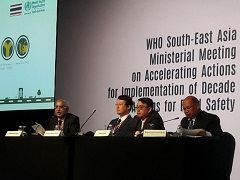- Home
- Technical Cooperation Projects
- Index of Countries
- Asia
- Thailand
- The Partnership Project for Global Health and Universal Health Coverage
- Project News
- The WHO SEA Ministerial meeting on "Accelerating actions for Implementation of Decade of Action for Road Safety"
Project News
2017-12-01
The WHO SEA Ministerial meeting on "Accelerating actions for Implementation of Decade of Action for Road Safety"

PHUKET, 29 November -1 December 2017- Thailand and WHO is hosting the WHO SEA Ministerial meeting on "Accelerating actions for Implementation of Decade of Action for Road Safety (2011-2020) at the Hilton Phuket Arcadia Resort & Spa, praising Phuket as a model of a successful city in reducing road fatalities by 50 percent.
Road traffic injuries kill approximately 316,000 people each year in the WHO South-East Asia Region (SEAR), equivalent to 25% of global road traffic deaths. In addition to deaths, up to 50 million people incur non-fatal injuries each year as a result of road traffic crashes, while there are additional indirect health consequences. Thailand is ranked among the top three countries for the highest number of road traffic deaths. Over 20,000 people or 62 people per day were killed in road accidents in 2016.
Over 150 representatives from various sectors such as transport, vehicle standard regulators, police and health, from countries within and outside the Region participated in the meeting and share road safety policy and lesson learned, namely Vietnam, Indonesia, Malaysia, and Japan.
Dr. Masao Ichikawa, Professor of Global Public Health, University of Tsukuba, has shared Japan's road safety successful experiences in reducing road traffic injury. Dr. Ichikawa admitted that in the early 1960s, Japan has experienced an enormous increase of traffic accidents as a result of the country's rapid economic growth. Until 1970, the annual number of traffic accident death persons in Japan continued to increase with the progress of motorization and peaked at 16,765 in late 1970. However, due to Japanese national government's comprehensive, intensive efforts to reduce the number of fatalities through the enactment of Traffic Safety Policy Basic Act in 1970 and sizeable investment in road safety installation and strengthened enforcement, annual fatalities then declined during 1970s and fell to 8,719 in 1981.
The experience of Japan offers prominent insight on how road traffic accident incidence can be systematically addressed by ‘framing the issue' and draws important lessons for both developed and developing countries with regard to the need for sizeable investment in road safety installation and strengthened enforcement in order to effectively reduce the incidence of traffic accidents and accident risk.
- About JICA
- News & Features
- Countries & Regions
- Our Work
- Thematic Issues
- Types of Assistance
- Partnerships with Other Development Partners
- Climate Change / Environmental and Social Considerations
- Evaluations
- Compliance and Anti-corruption
- Science and Technology Cooperation on Global Issues
- Research
- JICA Development Studies Program / JICA Chair
- Support for the Acceptance of Foreign HRs / Multicultural and Inclusive Community
- Publications
- Investor Relations
